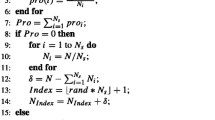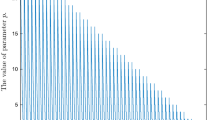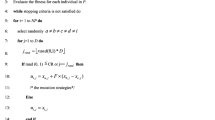Abstract
Differential evolution (DE) is an efficient population-based search algorithm for solving numerical optimization problems. However, the performance of DE is very sensitive to the choice of mutation strategies and their associated control parameters. In this paper, we propose a self-adaptive multi-population differential evolution algorithm, called SAMDE. The population is randomly divided into three equally sized sub-populations, each with different mutation strategies. At the end of each generation, all sub-populations are updated independently and recombined. Each sub-population uses an adaptive mechanism for selecting how current generation control parameters are generated. An improved mutation strategy, “rand assemble/1”, is proposed, its base vector is composed proportionally of three randomly selected individuals. The performance of SAMDE is evaluated on the suite of CEC 2005 benchmark functions. A comparative study is carried out with other state-of-the-art optimization techniques. The results show that SAMDE has a competitive performance compared to several other efficient DE variants.


Similar content being viewed by others
References
Ali MZ, Awad NH, Suganthan PN (2015) Multi-population differential evolution with balanced ensemble of mutation strategies for large-scale global optimization. Appl Soft Comput 33:304–327
Awad Noor H, Ali Mostafa Z, Ponnuthurai N et al (2016) A decremental stochastic fractal differential evolution for global numerical optimization. Inform Sci 372:470–491
Bi X, Liu G (2012) A cloud differential evolutionary algorithm for constrained multi-objective optimization. J Harbin Eng Univ 33:1022–1031 (in Chinese)
Bi X, Liu G, Xiao J (2012) Dynamic adaptive differential evolution based on novel mutation strategy. J Comput Res Dev 49:1288–1297 (in Chinese)
Brest J, Greiner S, Boskovic B, Mernik M, Zumer V (2006) Self-adapting control parameters in differential evolution: a comparative study on numerical benchmark problems. IEEE Trans Evol Comput 10:646–657
Cai Y, Wang J (2015) Differential evolution with hybrid linkage crossover. Inform Sci 320(C):244–287
Chen Q, Liu B, Zhang Q, Liang JJ, Suganthan PN, Qu BY (2014) Problem definition and evaluation criteria for CEC 2015 special session and competition on bound constrained single-objective computationally expensive numerical optimization. Technical report, Computational Intelligence Laboratory, Zhengzhou University, Zhengzhou China and Nanyang Technological University, Singapore
Das S, Suganthan P (2011) Differential evolution: a survey of the state-of-the-art. IEEE Trans Evol Comput 15:4–31
Das Swagatam, Mullick SS, Suganthan PN (2016) Recent advances in differential evolution-an updated survey. Swarm Evol Comput 27:1–30
Derrac Joaquín et al (2011) A practical tutorial on the use of nonparametric statistical tests as a methodology for comparing evolutionary and swarm intelligence algorithms. Swarm Evol Comput 1:3–18
Fan Q, Yan X (2015) Self-adaptive differential evolution algorithm with discrete mutation control parameters. Expert Syst Appl 42:1551–1572
Gämperle R, Müller SD, Koumoutsakos P (2002) A parameter study for differential evolution, advances in intelligent systems, fuzzy systems, evolutionary computation. WSEAS Press, Interlaken, pp 293–298
García-Martínez Carlos et al (2017) Since CEC 2005 competition on real-parameter optimisation: a decade of research, progress and comparative analysis’s weakness. Soft Comput 21:1–11
Ghasemi M, Ghanbarian MM, Ghavidel S, Rahmani S, Moghaddam EM (2014) Modified teaching learning algorithm and double differential evolution algorithm for optimal reactive power dispatch problem: a comparative study. Inform Sci 278:231–249
Guo H, Li Y, Li J, Sun H, Wang D, Chen X (2014) Differential evolution improved with self-adaptive control parameters based on simulated annealing. Swarm Evol Comput 19:52–67
Kong X, Gao L, Ouyang H, Shao Y (2014a) Adaptive differential evolution algorithm with bidirectional randomly multi-mutation strategy. Comput Integr Manuf Syst 20:1948–1958 (in Chinese)
Kong X, Gao L, Ouyang H, Ge Y (2014b) An improved differential evolution algorithm for large scale reliability problems. J Northeast Univ 35:328–332 (in Chinese)
Lampinen J, Zelinka I (2000) On stagnation of the differential evolution algorithm. In: 6th international mendel conference on soft computing, pp 76–83
Li R, Da F, Ouyang H, Gao L (2012) An improved differential evolution algorithm for reliability problems. J Northeast Univ 33:182–186 (in Chinese)
Li X, Tang K, Omidvar M, Yang Z, Qin K (2013) Benchmark functions for the CEC’2013 special session and competition on large scale global optimization. Technical report, evolutionary computation and machine learning group, RMIT University, Australia
Liu B, Lampinen J (2010) On setting the control parameters of the differential evolution method. In: Proceedings of Mendel 2002, 8th international conference on soft computing
Mallipeddi R (2013) Harmony search based parameter ensemble adaptation for differential evolution. J Appl Math. Article ID 750819
Mallipeddi R, Lee M (2015) An evolving surrogate model-based differential evolution algorithm. Appl Soft Comput 34:770–787
Mallipeddi R, Suganthan PN, Pan Q-K, Tasgetiren MF (2011) Differential evolution algorithm with ensemble of parameters and mutation strategies. Appl Soft Comput 11:1679–1696
Mukherjee R, Patra GR, Kundu R, Das S (2014) Cluster-based differential evolution with crowding archive for niching in dynamic environments. Inform Sci 267:58–82
Mukherjee R, Debchoudhury S, Das S (2016) Modified differential evolution with locality induced genetic operators for dynamic optimization. Eur J Oper Res 253:337–355
Ouyang H, Gao L, Kong X (2013) Random mutation differential evolution algorithm. J Northeast Univ 34:330–333 (in Chinese)
Pan QK, Suganthan PN, Wang L, Gao L, Mallipeddi R (2011) A differential evolution algorithm with self-adapting strategy and control parameters. Comput Oper Res 38:394–408
Plagianakos V, Tasoulis D, Vrahatis M (2008) A review of major application areas of differential evolution. In: Chakraborty U (ed) Advances in differential evolution. Springer, Berlin, pp 197–238
Price KV, Storn RM, Lampinen JA (2005) Differential evolution: a practical approach to global optimization. Springer, Berlin
Qin AK, Huang VL, Suganthan PN (2009) Differential evolution algorithm with strategy adaptation for global numerical optimization. IEEE Trans Evol Comput 13:398–417
Qiu X, Jiang Y, Li B (2015) Fractal mutation factor correcting differential evolution algorithm. Pattern Recognit Artif Intell 28:132–138 (in Chinese)
Ronkkonen J, Kukkonen S, Price KV (2005) Real-parameter optimization with differential evolution. In: Proceedings of the IEEE congress on evolutionary computation. IEEE Press, pp 506–513
Shang R, Wang Y, Wang J, Jiao L, Wang S, Qi L (2014) A multi-population cooperative coevolutionary algorithm for multi-objective capacitated arc routing problem. Inform Sci 277:609–642
Storn R, Price K (1997) Differential evolution—a simple and efficient heuristic for global optimization over continuous spaces. J Glob Optim 11:341–359
Suganthan PN, Hansen N, Liang JJ, Deb K, Chen Y-P, Auger A, Tiwari S (2005) Problem definitions and evaluation criteria for the CEC 2005 special session on real-parameter optimization, KanGAL report, 2005005
Wang J, Cai Y (2015) Multiobjective evolutionary algorithm for frequency assignment problem in satellite communications. Soft Comput 19:1229–1253
Wang Y, Cai Z, Zhang Q (2011a) Differential evolution with composite trial vector generation strategies and control parameters. IEEE Trans Evol Comput 15:55–66
Wang Y, Cai Z, Zhang Q (2011b) Differential evolution with composite trial vector generation strategies and control parameters. IEEE Trans Evol Comput 15:55–66
Weber M, Neri F, Tirronen V (2011) Shuffle or update parallel differential evolution for large-scale optimization. Soft Comput 15:2089–2107
Wu G, Mallipeddi R, Suganthan PN, Wang R, Chen H (2016) Differential evolution with multi-population based ensemble of mutation strategies. Inform Sci 329:329–345
Yongjie MA, Yulong BAI, Zhaoyuan JIANG (2009) Fast multi-objective constrained evolutionary algorithm and its convergence. Syst Eng-Theory Pract 29:149–157
Zaharie D (2003) Control of population diversity and adaptation in differential evolution algorithms. In: Proceedings of the 9th international conference on soft computing, Brno, pp 41–46
Zhang J, Sanderson AC (2009) JADE: adaptive differential evolution with optional external archive. IEEE Trans Evol Comput 13:945–958
Zhao J, Xu Y, Luo F, Dong Z, Peng Y (2014) Power system fault diagnosis based on history driven differential evolution and stochastic time domain simulation. Inform Sci 275:13–29
Zhao Z, Yang J, Hu Z, Che H (2016) A differential evolution algorithm with self-adaptive strategy and control parameters based on symmetric Latin hypercube design for unconstrained optimization problems. Eur J Oper Res 250:30–45
Zielinski K, Weitkemper P, Laur R, Kammeyer KD (2006) Parameter study for differential evolution using a power allocation problem including interference cancellation. In: IEEE congress on evolutionary computation, pp 1857–1864
Zou D, Wu J, Gao L, Li S (2013) A modified differential evolution algorithm for unconstrained optimization problems. Neurocomputing 120:469–481
Acknowledgements
We are very grateful to the three anonymous reviewers for their constructive suggestions and useful advices. This work is supported by the NSFC (National Natural Science Foundation of China) Project (Grant Nos. 41861047, 41461078), The authors would also like to thank Dr. Wu for providing the source code of MPEDE.
Author information
Authors and Affiliations
Corresponding author
Additional information
Publisher's Note
Springer Nature remains neutral with regard to jurisdictional claims in published maps and institutional affiliations.
Rights and permissions
About this article
Cite this article
Zhu, L., Ma, Y. & Bai, Y. A self-adaptive multi-population differential evolution algorithm. Nat Comput 19, 211–235 (2020). https://doi.org/10.1007/s11047-019-09757-3
Published:
Issue Date:
DOI: https://doi.org/10.1007/s11047-019-09757-3




